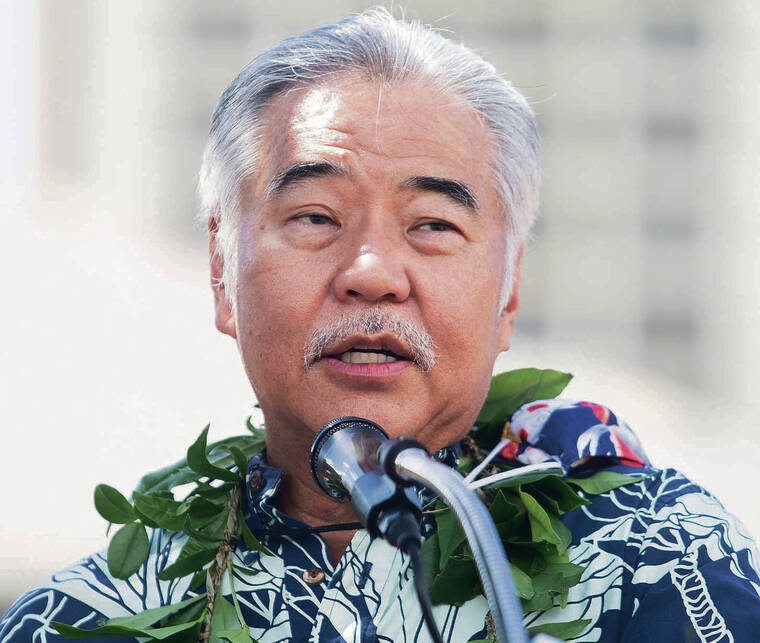U.S. governors want a seat at the table as international leaders gather in Scotland over the next two weeks at a critical moment for global efforts to reduce fossil fuel emissions and slow the planet’s temperature rise.
At least a half-dozen state governors, including Hawaii Gov. David Ige, plan to attend parts of the United Nations’ climate change conference in Glasgow, known as COP26, that started Sunday and runs through Nov. 12. Though states aren’t official parties to talks, governors hold significant sway over the United States’ approach to tackling climate change by setting targets for reducing carbon emissions and transitioning to renewable energy.
Take California, where Democratic Gov. Gavin Newsom has pledged to halt the sale of new gas-powered cars in the state by 2035, a move aimed at accelerating the nation’s transition to electric vehicles. Or Washington, where Democratic Gov. Jay Inslee backed legislation requiring the state’s electricity be carbon-neutral by 2030.
“Governors can do a lot,” said Samantha Gross, director of the Energy Security and Climate Initiative at the Brookings Institute. “When they’re talking to people on the sidelines and sharing policies and ideas and helping to demonstrate the commitment of the U.S. as a whole, there’s quite a bit that they can do.”
Ige will lead a delegation that includes Suzanne Case, director of the Department of Land and Natural Resources, and Scott Glenn, head of the Hawaii State Energy Office. The governor’s office did not immediately respond to a Honolulu Star-Advertiser request for Ige’s travel dates or his activities at the conference.
“Our state has been at the forefront of advocating aggressive action to curb global warming,” Ige said in a news release.
He noted that Hawaii was first in the nation in 2017 to enact legislation committing to the U.N. Paris Agreement. “We know that climate change is real because we see firsthand the effects of coral bleaching, sea level rise and wildfires,” he said.
Other governors — all Democrats — slated to attend are Inslee, New Mexico Gov. Michelle Lujan Grisham, Louisiana Gov. John Bel Edwards, Illinois Gov. J.B. Pritzker and Oregon Gov. Kate Brown. Newsom announced Friday he would participate virtually due to unspecified family obligations. California Lt. Gov. Eleni Kounalakis will instead lead the state’s delegation, which includes more than a dozen lawmakers and top administration officials.
Few U.S. states are as influential as California, which is home to nearly 40 million people and would be the world’s fifth-largest economy if it were its own nation. It’s led the nation in vehicle emissions standards, was the first state to launch a carbon pollution credit program known as cap-and-trade and has set some of the nation’s most ambitious goals on reducing emissions.
It’s the nation’s seventh-largest oil-producing state, though Newsom officials say the state has six times as many jobs in clean energy as it does in the oil industry. Newsom has made strides to lower demand and eventually end production, but some environmental groups say he has to act significantly faster.
Several other state leaders heading to Glasgow also come from places that rely on oil and gas production as a key piece of the economy. New Mexico’s Lujan Grisham travels to the climate conference as she juggles competing pressures from environ- mental activists and the fossil fuel industry while running for reelection in 2022.
“We — as a state, as a nation, as a planet — must go further by pursuing bold, equitable and just climate solutions. I am looking forward to this significant opportunity for collaboration and action at the global level,” Lujan Grisham said in a recent statement.
In March, Lujan Grisham wrote President Joe Biden, asking to exempt New Mexico from an executive order halting gas and oil production on federal land. Oil field royalties, taxes and lease sales account for more than one-quarter of the state’s general fund budget, underwriting spending on public schools, roads and public safety.
Edwards of Louisiana, a state that’s suffered significant flooding and damage from hurricanes, plans to promote his state as a hub for clean-energy projects. He’s set a goal to cut the state’s net greenhouse gas emissions to zero by 2050, though his administration is still putting together a strategy document for reaching that goal.
“No state in our nation is more affected by climate change than Louisiana, but it’s also true that no state is better positioned to be part of the solution to the problems facing our world,” he said recently.
Beyond sharing their own policy successes, the conference will provide a chance for governors to tout their states as good places for investment in clean technology. Fresh off signing a law pledging to make Illinois carbon-free by 2045, Pritzker plans to engage business leaders and entrepreneurs to coax investment in what the governor contends is the state’s growing green economy.
Inslee, meanwhile, will be leading a discussion with mayors and state leaders from nations around the world. He joined former California Gov. Jerry Brown and former New York Gov. Andrew Cuomo to launch the U.S. Climate Alliance in 2017 as the Trump administration was backing away from national commitments on climate change.
“Governors and mayors around the world do not believe we should rely just on our federal governments,” Inslee said Thursday during a news conference.
It’s critical for U.S. and world leaders to move from planning to implementation of aggressive climate strategies, said Katelyn Sutter, senior manager for U.S. climate at the Environmental Defense Fund.
“We need policy to back up pledges to reduce emissions,” she said. “That’s where a state like California, and now Washington and others that have momentum moving forward, can really be impactful.”

